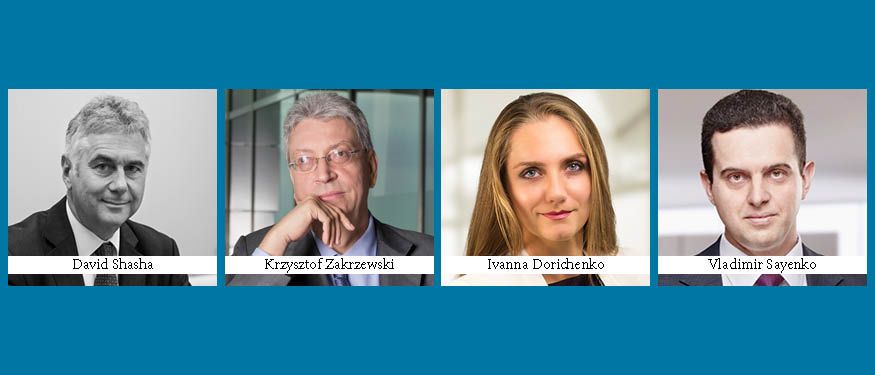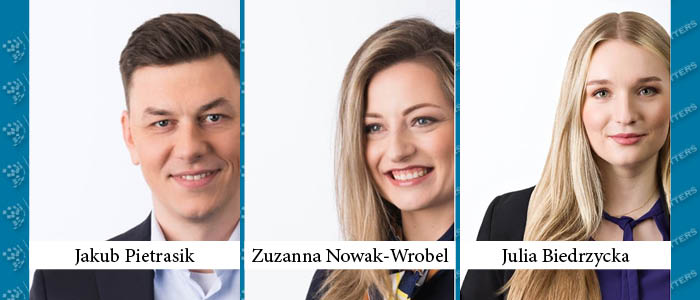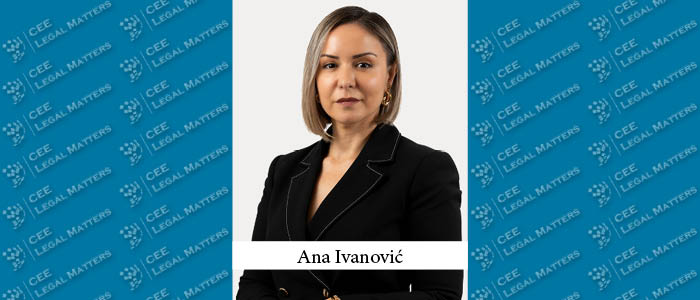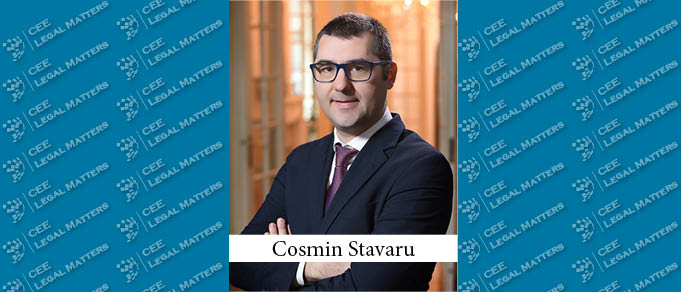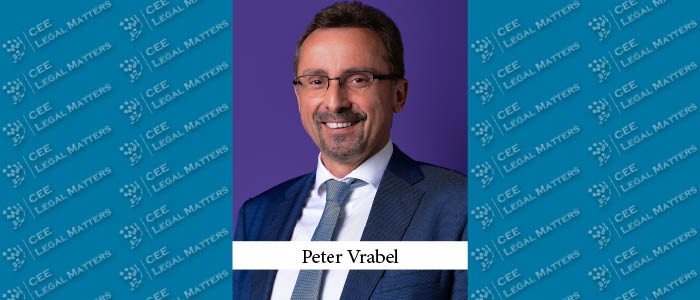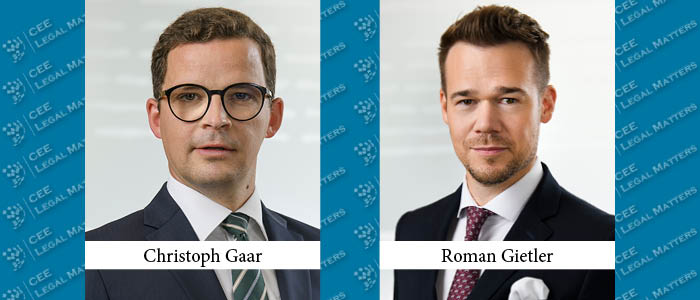On February 2, 2017, CEE Legal Matters reported that David Shasha, a well-known figure for several decades in CEE’s emerging legal markets, had agreed to come out of retirement to join Poland’s Domanski Zakrzewski Palinka law firm as Counsel. Shasha, who will be working in London, will co-ordinate DZP’s relationships with law firms, financial institutions, and companies located in the United Kingdom, as well as supporting DZP’s lawyers advising international and Polish clients.
We spoke with Shasha and DZP Partner Krzysztof Zakrzewski to learn more about the arrangement, and spoke with Partners from two other CEE-based law firms with representatives in London – Sayenko Kharenko and Integrites – to see how their English strategies and operations compare.
David Shasha Spreads the DZP Gospel
DZP Partner Krzysztof Zakrzewski says that “an important part of [DZP’s] business has been ‘London related’ for many years,” and thus the firm’s decision to put someone on the ground in the UK “is not a new idea - we were contemplating ‘opening’ in London for quite a while.” Zakrzewski says he and his colleagues considered various options as to what form that presence would take, “including opening a full office, opening a representative office, or forming a joint venture of some kind with another firm from continental Europe.”
Eventually, they decided to reach out to an old friend.
David Shasha has worked with international law firms for over 30 years. From 1978 to 2001, before joining DZP, he worked at Clifford Chance (where, among other things, he founded the firm’s Warsaw, Prague, and Budapest offices), Simmons & Simmons, Gowlings (now Gowling WLG) and Watson Farley & Williams. He retired from Watson Farley & Williams in December 2015, taking a full year off before agreeing to work with DZP.
The opportunity to join DZP came unexpectedly. “I hadn’t been looking for a job,” Shasha laughs. “I promised myself when I retired that I would spend a year not doing any work – I would spend a year living (as opposed to working) in London, taking advantage of the chance to visit many of the places I have never previously had time to see.” Still, when old friend Zakrzewski reached out to him to discuss options, Shasha was game. “We met up initially early last year, and had a number of conversations during the year about what I might be able to do for DZP. We discussed several ideas and plans and reached an agreement at the end of the year.”
And in joining DZP Shasha capitalizes on a long relationship with Poland. He says, in describing his history with the country, “I was the partner who was responsible for opening the Clifford Chance office in Warsaw in 1992. I spent long periods of time in Poland from 1991 to 1995; I had a flat I lived in here, and I attempted to learn Polish (unsuccessfully). But I did get a Polish girlfriend, who subsequently became my wife; we’ll be celebrating our twentieth wedding anniversary this year!”
Still, in his new role, Shasha will remain in his native England. “I’m going to be based in London. That’s home. I will occasionally visit Warsaw to show my face to people, but it’s a London-based role. It’s arranging introductions to contacts in London and elsewhere, for the purposes of business development for the firm. It’s supporting the firm’s marketing and business development initiatives generally, and helping to raise the firm’s profile.”
Shasha’s target list is broad. “The principal targets are law firms,” he says, “but also includes some corporates and other institutions – private equity houses, funds, and other financial institutions – who are interested in and active in what’s going on in Poland.”
Shasha emphasizes that DZP is not opening an office in the UK, nor currently planning to do so. Nor will it be relocating any Polish lawyers to London as part of this initiative, though DZP lawyers will of course continue to make regular visits to the city. Still, neither Shasha nor Zakrzewski will close the door on the possibility of opening a formal office down the road. “Of course we do not exclude such option should a need for further development occur,” says Zakrzewski. “At this point, however, we decided that a formal representation by David is sufficient.”
Ultimately, it appears that DZP’s decision to hire Shasha for this new role was a matter of the right person being available at the right time. Zakrzewski says, “as our business in London was growing and as we were seeing even more opportunities – the need for a London presence became more and more urgent. No mystery. We started when we felt we were ready. We did not plan to do it on this given date a long time ago. We also did not plan this move in relation to any development or political situation, like Brexit. It all developed quite naturally.”
Contact Office: Integrites’ Office is a Bridge to CEE/CIS
In September, 2016, Integrites announced the appointment of Ivanna Dorichenko as new Head of the firm’s London office and leader of the firm’s newly established London-based International Trade & Commodities practice. Prior to joining Integrites, Dorichenko worked for four years in the London offices of Clyde & Co and another two with Hammonds, which later rebranded as Squire Patton Boggs. She was the first Ukrainian barrister ever called to the bar by the Inner Temple.
In a statement at the time, Integrites Senior Partner Vyacheslav Korchev said, of Dorichenko’s decision to join the firm, that: “Given her skills, experience, and well established reputation on the London legal market she will undoubtedly add the exquisite London touch to our international operations, which will place us in a unique position on Ukrainian and regional legal markets.”
Integrites itself only opened its doors at the end of 2005. According to Dorichenko, it opened its London office less than five years later, in 2010, “because of the increasing volume [of] work both ways, the need to be here, the need to work as a main point of contacts for our clients who needed something in England, and then obviously to grow the client base, grow the relationship base, and increase the general visibility and workload, et cetera.
And unlike DZP, Integrites has chosen to operate an actual office in the English capital, though at the moment it’s staffed by only two lawyers. Dorichenko explains that “we are of course not a full-service office but rather a permanent contact office from which we do our niche commodities work (my practice) and advise/represent a small number of international clients in trading matters, including our clients from the CIS/Black Sea trading area.”
Dorichenko insists that Integrites – which also has offices in Ukraine, Russia, Kazakhstan, China, and the Netherlands – understands the expectations of clients in London. “Our founding partner’s ideas for opening the office in London were. we wanted to make sure we were up to the standard, and we would be able to compare ourselves to the local standard, and we would be able to help our clients as much as we can.”
Dorichenko is skeptical that an English presence, if focused only on business generation and marketing, will be enough for the most demanding clients. “I don’t believe that a pure sales person can do the job,” she says. “Because you should be someone who understands how the work is done, you should do the work, because that is how people will perceive you as their equal, because here in London people are very robust, people are very evidence-based. They don’t want to talk to sales people. Cold calls don’t really work here.”
Thus, Integrites’ London office serves as a conduit between the London-based firms who are sources of referral work to the firm’s Ukraine and CIS presence, and the firm’s own clients coming from that part of the world who may need English assistance. According to Dorichenko, “we really function as a bridge.”
Sayenko Kharenko’s “Value Added” Representative Office
“Our story is simple,” says Sayenko Kharenko Founding Partner Vladimir Sayenko. “We noticed that London has by far the largest concentration of our international clients and decided that we want to be closer to them, as well as to law firms that often refer business to us. The office also helps us a lot when partners and clients of the firm travel to London.”
Sayenko Kharenko’s office in London opened its doors in 2013, led at the time by Andy Hunder, who had earlier launched the London office of Magisters (before that firm’s merger with Egorov Puginsky Afanasiev & Partners). According to Sayenko, in addition to coordinating Sayenko Kharenko’s business development efforts in London, “Andy’s task was to launch a government relations practice. The challenge back in 2013 was to convince our typical multinational clients that GR services could be provided in Ukraine without raising typical compliance issues that [such] lobbying services used to raise in Ukraine. Coordination of this practice from London by a UK expert who used to work for several multinationals helped us position our firm properly in this new segment.”
Currently, the firm’s London office is run by Eugenia Rebotunova, a Ukrainian, Russian, and New York-qualified lawyer with a background involving time spent at both Altheimer & Gray in Kyiv and White & Case in Moscow. According to Sayenko, “while Eugenia primarily develops and maintains relationships with our London-based clients and friendly law firms, we also rotate several Ukrainian lawyers in the London office to advise clients who are interested in doing business in Ukraine and prefer to have face-to-face contact with their legal counsel. Ukrainian clients also often require support choosing lawyers and other providers for their business needs, arranging meetings and sometimes they even need help with basic logistic support during their trips to London. Finally, our firm actively participates in the activities of various professional organizations, such as the British-Ukrainian Law Association, and in the life of the Ukrainian diaspora in the UK. All of these activities keep our team in London busy and we are think that our London team will grow in the near future.”
Sayenko emphasizes that the firm’s London office is a “pure representative office with auxiliary functions,” and that “we do not handle any matters through the London office at the moment, although the model might change in the future.” He points out that “English clients asking for English-law advice would not be the target client for a Ukrainian law firm in any case,” and that “even when it comes to Ukrainian law advice, these matters are handled by the Kyiv office.”
Still, the firm’s representatives in London do more than business development. “There are matters where clients appreciate personal meetings with their trusted advisors who will hold their hand in a difficult transaction or a complex dispute matter,” Sayenko says. “That is why senior Ukrainian lawyers rotate on a regular basis in London, essentially coming on lengthy business trips.”
Clients appreciate the service, Sayenko says. “When it comes to Ukrainian clients, the assistance they require is not legal advice, but ‘value added’ practical advice, which comes at no cost to the client. We also have some clients who schedule important meetings on sensitive matters outside of Ukraine for confidentiality reason and London serves that purpose perfectly well.”
Be that as it may, BD is hardly a secondary consideration. Sayenko concedes that “the main function of our London office is clearly the promotion of the firm’s capabilities in Ukraine to potential clients and major international law firms and cooperation with international legal publications and directories, as well as other BD activities.”
By Graham Conlon, Partner, CMS
This Article was originally published in Issue 4.2 of the CEE Legal Matters Magazine. If you would like to receive a hard copy of the magazine, you can subscribe here.

